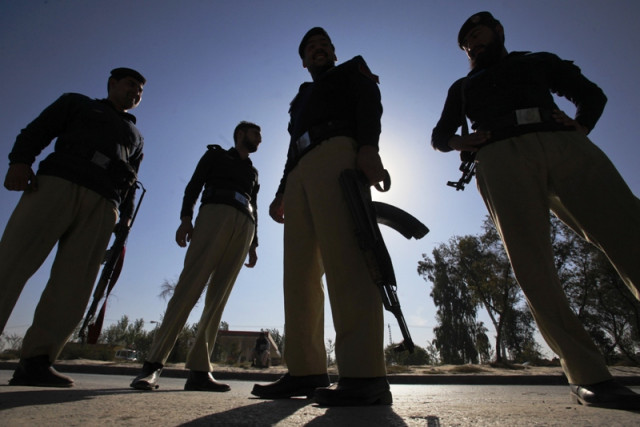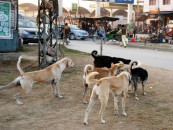Police pickets: Intimidation or crime fighting?
The barricaded ‘security’ check posts are serving as corruption hotbeds for black sheep in the police department.

“Before the days of barricades, every police officer knew the streets in his beat and the people living in them. Now they don’t even know what areas their beats cover,” said a police official. PHOTO: REUTERS/FILE
It is considered the worst policing strategy in the civilized world, yet it has become the Islamabad police’s favourite ‘counter-terrorism’ strategy, and lately, a ‘convenient crime-fighting solution’. Yes, we are talking about road barricades. In the beginning, they were over hundred, mostly set up by blocking roads with concrete blocks manned by a handful of ‘confused’ cops, unsure of what they were supposed to be looking for. Although the number has now come down to sixty, the level of inconvenience for people remains the same.
Has this strategy ever worked when it came to preventing terrorist attacks or crimes like carjacking, robberies, kidnappings and muggings?
The answer, is no.
Instead, the barricaded ‘security’ check posts have increasingly become a permanent source of insecurity and nuisance for commuters, besides serving as corruption hotbeds for black sheep in the police department.
“Before the days of barricades, every police officer knew the streets in his beat and the people living in them. Now they don’t even know what areas their beats cover,” said a police official from Aabpara Police Station. He said policemen generally hate standing like fools at the pickets. “This is not policing. We are not some run-of-the-mill security guards,” the official added.

A police official from Shalimar Police Station said that before the check-point trend kicked off, more police mobile units and patrolmen were deployed in areas with higher rates of street crime. “Now, even mobile units are deployed at check-points, which most criminals can easily evade,” he added. The officer said cell phone snatching and mugging in particular have shot up since the inception of the picket strategy.
“Muggers and street criminals know that the police presence is confined to the check-points, so they roam freely and strike at will before quickly vanishing into the unprotected streets,” said the police official.
More pickets were established at the main exit points of the town specifically to address the ever increasing incidence of carjacking. But the plan failed miserably. Carjackers always found new ways to get out of the city. The police’s own statistics showed that the number of carjacking incidents recorded an all time high in 2011 and kept steadily rising since then.
Barricades have also not stopped kidnappings for ransom. Many businessmen, particularly those from minority communities, were kidnapped from Islamabad by militants, taken to Pakistan’s lawless tribal areas and eventually released after paying heavy ransoms. In fact, the capital’s police even saw one of its own inspectors picked up in 2010.
He has not been heard from since.
On the other hand, the barricaded check-points continue to serve as ‘hunting grounds’ for some policemen. Besides taking petty bribes after harassing commuters over tinted screens and windows or not carrying the original vehicle registration documents, some policemen have even been found using the opportunity to pick pockets.
Last year, a group of policemen from Sabzi Mandi Police Station were busted for lifting people’s wallets and cash during body searches. “Many local traders lodged complaints with the police station that their pockets were being picked by policemen deployed at check-points,” said a Sabzi Mandi police official.
He said the duty registrars at the station were fully aware and often involved in the criminal acts of such cops.

When such complaints increased, the Inspector General of Police (IGP) had to order a major reshuffle of duty registrars at different police stations. The registrars were apparently assigning their ‘favourite’ police officials at potentially lucrative check-points, and then take their cut from the daily pickpocket return, the police official added.
Moreover, not only do long queues of vehicles at check-points during rush hours offer soft targets for terrorists, but the concrete blocks present a serious hazard. In one such incident at the check-point on IJP road, a van hit one of the concrete blocks, fatally injuring a police official standing guard there.
Police bosses, however, have always boasted highly of the ‘efficacy’ of their barricade strategy in crime fighting and counter-terrorism. “This strategy is working fine for us. It deters the terrorists,” said a senior police officer.
However, a cursory look at the timeline of major terror attacks in the city since the inception of the strategy tells an entirely different story. Terrorists were never deterred by the barricades. All major suicide bombings and other terrorist activities took place while the barricading was at its peak. If they could not stop terrorists or even ordinary criminals from entering or leaving the city after the crimes, what good were the dozens of barricades serving?
Published in The Express Tribune, April 22nd, 2013.



















COMMENTS
Comments are moderated and generally will be posted if they are on-topic and not abusive.
For more information, please see our Comments FAQ